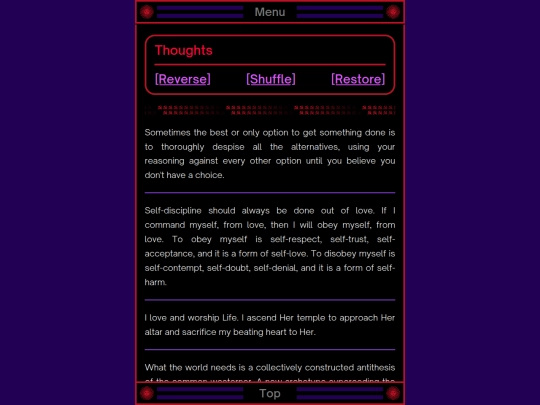Neocities.org

 proletarian-library
1 week ago
proletarian-library
1 week ago
it will take forever to write this so I just wrote a summary. I'll try not to leave any more update notifications until the first draft is finished
 wraithcastle
1 week ago
wraithcastle
1 week ago
yes allthe time which is why i like neocities (less judgey environment mostly that lets me flex the socializing/social media muscle without too much shame)
 virtually-isolated
1 week ago
virtually-isolated
1 week ago
I was not made to read 2000 tweets per hour meant to enrage me for clicks and post every 20 minutes. I'm an ancient little thing that only tells my tales by the campfire once a week.
 lakestheguy
1 week ago
lakestheguy
1 week ago
yeah i prefer neocities to social media. like a lot of people seem so confrontional on social media. while neocities has some features borrowed from social media, the environment feels less hostile and more cozy, probably because people are more focused on coding their websites
 letslearntogether
2 weeks ago
letslearntogether
2 weeks ago
Looking forward to reading more...1. To be honest, most human-created land borders have always been arbitrary to me. The only distinctions that actually make practical sense are ecological (e.g.: "bioregion", "climate zone", etc.), because different areas require different forms of care, ways of sustainably integrating human activity into that environment.
 letslearntogether
2 weeks ago
letslearntogether
2 weeks ago
2. I also find physical human characteristics (e.g.: "race", sex, etc.) as mostly arbitrary when it comes to getting along. All humans share fundamental needs to some extent. We should be working together to fulfill them, but many people attach themselves to labels like "nationality" and want to war over "natural resources" and abstractions like "power" and "money".
 letslearntogether
2 weeks ago
letslearntogether
2 weeks ago
3. The only things that seem to distinguish human beings from one another in any meaningful way are their languages and histories/experiences. And not in the sense of one being "more" or "less" than any other, but in the sense that those differences have the potential to inhibit communication between them. By learning one another's language(s) and being open to dialogue, we can find the common ground.
 letslearntogether
2 weeks ago
letslearntogether
2 weeks ago
4. Upon that shared foundation, we can finally build a decent quality of life for all with harm to none if we so choose. In other words, the more that we realize point #2 above, the more that we can intentionally work together on point #1, but point #3 has to happen first.
 proletarian-library
2 weeks ago
proletarian-library
2 weeks ago
thank you for reading what little I put out, and I appreciate your thoughts and input, all of which have been put into consideration. I will need to deconstruct the concept of nationality in particular somewhere along the way but I can only write, like, three paragraphs a day before I burn myself out
 letslearntogether
2 weeks ago
letslearntogether
2 weeks ago
Brilliant quote. I'm curious what the source is. Many people seem to worship the trivial, take for granted the practical, and still miss that every life is priceless.
 proletarian-library
2 weeks ago
proletarian-library
2 weeks ago
can't confirm but I think it's Stephen Jay Gould. I read it (or a variation of it) from another source that I can't remember a long time ago and it has stuck in my mind ever since
 letslearntogether
2 weeks ago
letslearntogether
2 weeks ago
You're right on it. After a quick search: It is at the end of Chapter 13 "Wide Hats and Narrow Minds" of Stephen Jay Gould's book "The Panda's Thumb: More Reflections in Natural History". This, in turn, is the second out of a ten volume anthology of essays taken from the "This View of Life" column that he wrote for Natural History magazine.
 letslearntogether
2 weeks ago
letslearntogether
2 weeks ago
The essay itself has to do with some racist and sexist history behind attempts to correlate "intelligence" with brain size and other bodily characteristics (particularly the work of Pierre Paul Broca and Edward Anthony Spitzka). Generally, by seeing oneself as "more" and others as "less", one can then rationalize "rewarding" the former and "punishing" the latter.





































































































































































































nostalgia is a weapon used by the corporate feudal state to sanitise memories and suppress the desire to learn or to innovate. used in tandem with fascism, it can quell dissent, encourage consumption, and discourage learning.
@badgraph1csghost - Interesting observations. I agree. Nostalgia can be used to manipulate people towards what is essentially slavery, *but* so can fantasies about an 'ideal' future (e.g.: "Futurism", techno-authoritarianism under the "utopian" guise of "The Californian Ideology"/"Effective Accelerationism", "Globalization" as a mask for the same old imperialism + colonialism, and so on.).
One needs to be *both* "progressive" in the sense of healing the destructive as rapidly as possible (before it becomes irreversible) and "conservative" in the sense of making the constructive as lasting as possible (while still being flexible enough to adapt). Therefore, I think the notion of a "political compass" is completely broken and I look at how consequences of actions differ from statements of ideology.
For example, healing from the atrocities of past events is different from trying to "sanitize" historical records in order to hide corruption within current social institutions. Likewise, trying to create a "utopic ideal" by enacting policies that only serve a few is a dystopia to everyone else. Similarly, over extraction of resources is not "interdependence", control through debt is not "aid", etc.
@letslearntogether right now, nostalgia is being used as a smokescreen. remakes and re-envisionings of older media, remastered versions of old games, and certainly the whole notion of "frutiger aero" are being used to get people to focus on the past as the future is being destroyed by political strongmen...
meanwhile, people who were around for the "frutiger aero era" are discarding their memories of the time in order to focus on this very inconsequential piece of commercial art history. getting everyone nostalgic for the past makes them less willing to engage with the present in all its horror. "think back, wasn't it easier back then? you can get back there you know."
nostalgia isn't /bad/, necessarily. it's just that the corporate feudal state has discovered how to use it to manipulate people using generative AI and analytics algorithms. i feel like more people are engaging with it than dealing with life anymore.
nice. I wasn't thinking about any of these things
Believing in a more humane future and taking action through sharing knowledge, informations, and respect to contribute for a better world. Definitely standing with people who refuse to be lulled by unfounded influences and consumerism.
Past and memories are parts of the history and we should not forget that. We have to build with the consideration of it to go further (where ?) and to focus on three tenses : the past, the present and the future. And not neglect any of them.
Depending on the situation an individual is in, they might or not be able to perceive the problem they are causing indirectly. Some people will prefer to sit on their gold (litteraly minerals) and protect it because they glued values on it while some are starving drinking water. You stand up when you have to, when there is injustice and the established states are not fair to everyone due of individualism, properties
*and enrichment of the elites. We have to act, to point it to make it change because this is not right. Of course, we have to know the rules to transgress it, self-education is important to elevate your mind and strategies. Correspondances is also a very smart move. (anyways, sorry my english is beeeed)
correspondence is good!